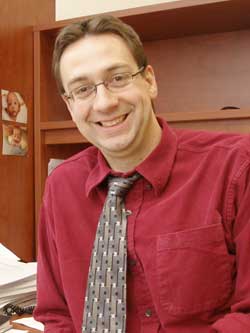Goffaux studies the adaptive brain

Goffaux is settling into postdoctoral life at the Université de Sherbrooke.
Photo by Perry Beaton
A spring PhD graduate, Philip Goffaux is already pursuing a postdoctoral fellowship at the Université de Sherbrooke, where he is examining the effect of placebos on how the brain processes pain.
To do so, he is looking at ERPs or event-related potentials. These measurable jumps in the brain’s electrical activity can be observed within a short period (usually milliseconds) of exposure to stimulus.
His expertise in the use of ERPs was developed at Concordia during doctoral studies at the Centre for Research in Human Development under both Dolores Pushkar and Natalie Phillips.

“It was fantastic experience for me,” he said.
Goffaux’s work focused on cognitive function, and more specifically on how the brain adapts — or doesn’t — to deal with things such as planning, coordination, multitasking and holding information as we get older. Previous research in this area has clearly shown that cognitive function tends to decrease or at least slow down with age.
“There’s a definite trade-off of speed for accuracy,” explained Goffaux. However, it had never been studied using ERPs.
With healthy adult subjects of different ages, Goffaux measured ERP activity while they performed a variety of executive tasks.
“We’d read out something like ‘R 3 A 7’ and ask them to order the numbers from smallest to largest, and the letters in alphabetical order.” He laughed. “It sounds simple, but it can be quite challenging.”
Goffaux demonstrated that older adults who maintain better cognitive function are somehow recruiting different parts of the brain, particularly the prefrontal cortex, as a kind of temporary storage or working memory.
“Their brain waves differed significantly from those who were less successful at the task.”
The good news: If you have good working memory, you are more likely to maintain better memory as you age. And as Goffaux explained, even if you don’t have great working memory now, you can likely improve it to see long-term benefits.
“Crossword puzzles, sudoku— these are all good, but even physical exercise helps. It seems that what is good for the heart is ultimately good for the brain.”